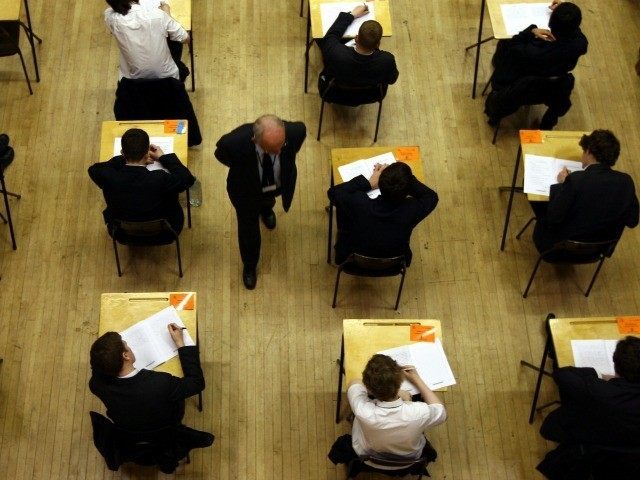Last week, the Texas House approved a bill that would require public school students to pass a U.S. citizenship test as a high school graduation requirement. It would also eliminate the state’s current U.S. history year-end exam.
Not everyone agrees this is such a great idea.
The patriotic sounding House Bill 1776 proposes administering the U.S. Citizenship and Immigration Services test to Texas high schoolers even though the tool is designed for prospective U.S. citizens as part of the naturalization process. While the bill does not address how, if any, material would be covered, it requires all test questions be given in a multiple choice format. Students must answer at least 70 percent of the questions correctly to pass.
The actual citizenship test requires applicants to successfully answer six out of 10 questions culled from a list of 100 total questions on U.S. history and government. It is not a multiple choice test, according to the U.S. Citizenship and Immigration Services.
Random samples from the U.S. citizenship practice test ask questions like “What is the supreme law of the land?,” “What is one right or freedom from the First Amendment?,” “Who makes federal law?,” “Why did the colonists fight the British?,” Why does the flag have 50 stars?,” What ocean is on the West Coast of the United States?,” and “Where is the Statue of Liberty?.” It also asks for the names of the President during the Great Depression and World War II plus the name of the President now.
H.B. 1776 proponents support replacing the state’s U.S. history end-of-course (EOC) exam better known as the State of Texas Assessments of Academic Readiness (STAAR), which they assert is too long and contains too much information to be mastered in one school year.
Breitbart Texas reached out to H.B. 1776 lead author Representative Trent Ashby (R-Lufkin) but he did not respond to our emailed questions inquiring specifics about the bill. However, in an op-ed for the Lufkin News, he defended dumping the U.S. history STAAR: “The elimination of the U.S. history end-of-course exam is part of a national movement to do away with a test that fails to address the most fundamental aspects of American citizenry.”
It remains unclear what are those fundamental aspects he references. Should H.B. 1776 become law it will apply to students who enter the ninth grade during the 2018-19 school year although it is not a grade specific-administered test.
Opponents question the validity of a so-called civics test crafted for prospective citizens and not students. Also, at a time when many decry high-stakes testing, some fear requiring a U.S. citizenship test opens the door to another standardized test.
State Board of Education (SBOE) member Pat Hardy voiced strong concerns that a U.S. citizenship test only measures “rote memorization” of rudimentary facts. A veteran social studies teacher and social student coordinator, Hardy urged her district representatives to vote against H.B. 1776 in a letter. In part, she wrote:
To replace our 11th grade EOC with the watered-down citizenship test promoted by H.B. 1776 would in no way help us ensure that our students are prepared with the knowledge and skills they will need to participate meaningfully in our democracy and in our government in future years.
Hardy emphasized that the grade 11 U.S. History STAAR requires students to know content and to apply it, also testing “students’ ability to think critically which is a 21st Century skill.”
She underscored that students only take two social studies STAAR tests during their K-12 school years — both in grades where U.S. history is taught, which might be applauded given in 2015, the “Nation’s Report Card” showed a meager 18 percent of eighth grade public school students as “proficient” or above in U.S. history, while only 23 percent were proficient in civics, Breitbart News reported.
Texas public schools concentrate on U.S. history in two parts — grades eight and 11 — covering colonial times through 1877 and from 1877 to the present. The state standards, the Texas Essential Knowledge and Skills (TEKS) say: “The student will demonstrate an understanding of issues and events in U.S. history.”
Breitbart Texas spoke to SBOE chairwoman Donna Bahorich who pointed out she always encourages people to look at the state’s eighth and 11th grade social studies standards and then peruse corresponding grade level released STAAR test questions. “I think parents and the general public would be pleasantly surprised by the quality of what is being asked of our students to learn. It’s not rote memorization of facts.”
Bahorich said students are asked to think critically about important concepts fr0m our nation’s founding to the present which she said “our courses address but the citizenship test certainly doesn’t represent that.”
In the Lufkin newspaper Ashby insisted H.B. 1776 “helps to promote fundamental knowledge that is critical to engaged and productive citizenry.” So did state Representative Bill Zedler (R-Arlington) who, in 2015, proposed H.B. 829 to add a U.S. citizenship test to the state’s high school graduation requirement. The bill fizzled. The Texas State Teachers Association opposed it, doubting more students would become civic-minded and participate in politics. They worried the bill would result in more teaching to the test.
However, Ashby’s bill may have more legs since he folded a version of it into House Bill 515, which slashes nine other STAAR tests, including the one for the eighth grade social studies course that covers U.S. History to 1877, replacing it with the citizenship test. The Texas Senate received H.B. 1776 and H.B. 515 last Friday.
Two years ago, Arizona became the first state to pass a law requiring students to take a U.S. citizenship test to graduate from high school. Today, 15 states mandate this test.
Follow Merrill Hope, a member of the original Breitbart Texas team, on Twitter.

COMMENTS
Please let us know if you're having issues with commenting.